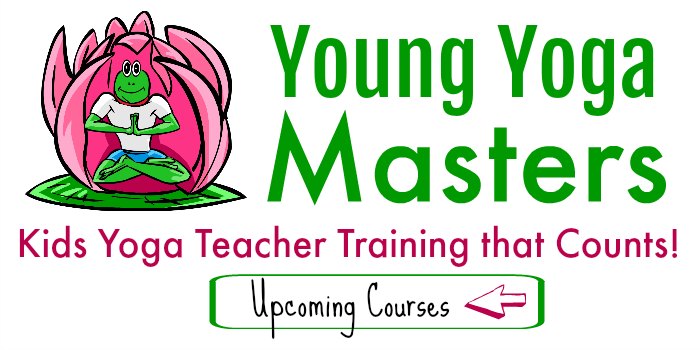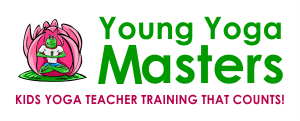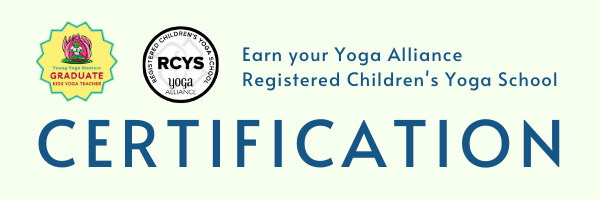 Continuing on the questions that came in around getting certified as a kids yoga teacher.
Continuing on the questions that came in around getting certified as a kids yoga teacher.
When it comes to getting certified to teach kids yoga the ideal would be to have Yoga Teacher certification. I could write pages on what this means and there are many commentaries on what this means so I’ll keep my opinions about it as brief, well – as brief as possible.
We’re in a new era. The thousand year old tradition of Yoga used to be study with a Yoga Teacher/Master/Guru, the passing on of technique, and the transmitting of Universal truths, the timeless wisdom of the Ages. In this way teachings were established, lost, and sometimes misinterpreted.
Old School Teacher Training
For some students it would take years before their Guru told them teach, for others it would happen in a day. There were no set number of hours for certification and in those remote caves and monasteries, forests and farms, the Guru sculptured the student until they were ready.
Then yoga came to the west and people began to question how this system could ever translate here. Some people were holding yoga teacher certifications in a weekend and some took years. Is this fair? How do we know if they are good or not?
The Movement for Regulations in Yoga Teacher Training
Then, a movement began to create a standard for yoga teachers. I remember hearing about it at the Kundalini Yoga retreats while it was happening, and it didn’t sound like an easy process. It involved many lineages of yoga coming together and agreeing on a number of hours (200 for level 1), a curriculum (see here), and a structure. In September 1999 Yoga Alliance began registering teachers based on standardized training. These standards are spreading all over the world.
It can be hard to get a yoga teaching job if you aren’t certified, unless you offer yoga in your home to people who just want to learn from you.
Kids Yoga Has No Special Requirements for Yoga Teachers
As far as I know, there are no extra standards for teaching kids yoga. And I’m not going to suggest it to anyone!
The Cost of Getting Certified and Becoming a Teacher Trainer
When I was certified (1998) by KRI, before the registry was in place, my teacher training course cost about $1200. Now, a 200 Hour course costs between $3,000 – $5,000. On top of that your Yoga Alliance registration costs $110 the first year and $55 – $400 (if you want to train others as a registered school) to renew each year. (I have never bothered to register with Yoga Alliance, but have looked into it as more people are asking about it).
My Kundalini Yoga Teacher’s Association dues in 2009 were $68 (US) per year (at least I get a profile page on this site).
If you want to meet the standards to become a teacher trainer registered with Yoga Alliance, you have to have advanced training at the 500 level. In Kundalini yoga it could cost you another $5,000 – 8,000 in tuition. But that doesn’t automatically allow you to be a yoga teacher trainer. There is a whole other apprenticing process on top of it.
I think other styles of yoga may be less/more costly and regulated. If you know leave a comment.
Become a Certified Yoga Teacher, But if you can’t…
Of course I recommend that everyone who wants to teach children’s yoga become a certified yoga teacher. But if you are making $10 an hour working at a daycare and want to introduce children’s yoga for fifteen minutes during your circle, or a school teacher who wants to do yoga for a break in the classroom, or a parent meditating to help kids build their concentration and reduce their stress, there are safe ways to do kids yoga until you have the opportunity to become certified.
For me, the important thing is to introduce kids to yoga in a safe and fun way, so they grow up enjoying exercise and meditation which in turn can lead to greater joy in life. I don’t think certification can guarantee this, it is up to the teacher to teach what they know and to be safe and have fun doing it.

Aruna Humphrys
© YoungYogaMasters


Thanks for the feedback Debbie, it helps to be reminded of the positives!
Just a follow-up. I mentioned in my previous post how I questioned why I have to belong to Yoga Alliance and what my membership did for me. One answer became clear shortly afte my post. Yoga Alliance does a great job with staying current. It constantly watches state legislators who may want to over regulate the industry or “define” what a yoga teacher is or does. I am happy about this.
Thanks for the comment Debbie – I agree. I hope people realize so much depends on the personal practice and not the theory and regulations.
Hello Aruna. What do I think about certification? Well, first let me say I am certified, and I am registered through Yoga Alliance. I teach adults, but I also teach kids from preschool up; I have no yoga certification to teach kids. Instead, I have knowledge and I continually seek more knowledge in terms of how to make yoga accessible to and safe for kids. I completely agree that one should be very discriminating when it comes to trainings and certifications. I also feel yoga has become big business, with people wanting to offer certifications for every single thing, just to make a buck. It’s like once you become a yoga teacher, you are continually being asked to fork over more and more money for this and that. Yoga Alliance registration is a prime example of this. It’s a wonderful premise, creating standards for the public’s safety, but why must I pay a fee every year as opposed to a fee every 3 years when I submit my continuing education info. And why, do I have to attend a workshop etc. as part of my continuing education, when I happen to be a person who enjoys reading and researching information instead. You can have one person who jumps through all the hoops, completes a teacher training, gets certified, attends every conference and workshop known to man, and still they may not be a good teacher. On the reverse, you can have someone who takes the less is more approach, reading everything about yoga they can get their hands on; networking with other teachers; maintaining their own practice, attending classes with the same teacher (in essence being mentored (guru?)). In short(I guess it’s too late for that)certification doesn’t necessarily make you qualified. Depending on the person, it could be a good place to start, but it’s only the beginning.